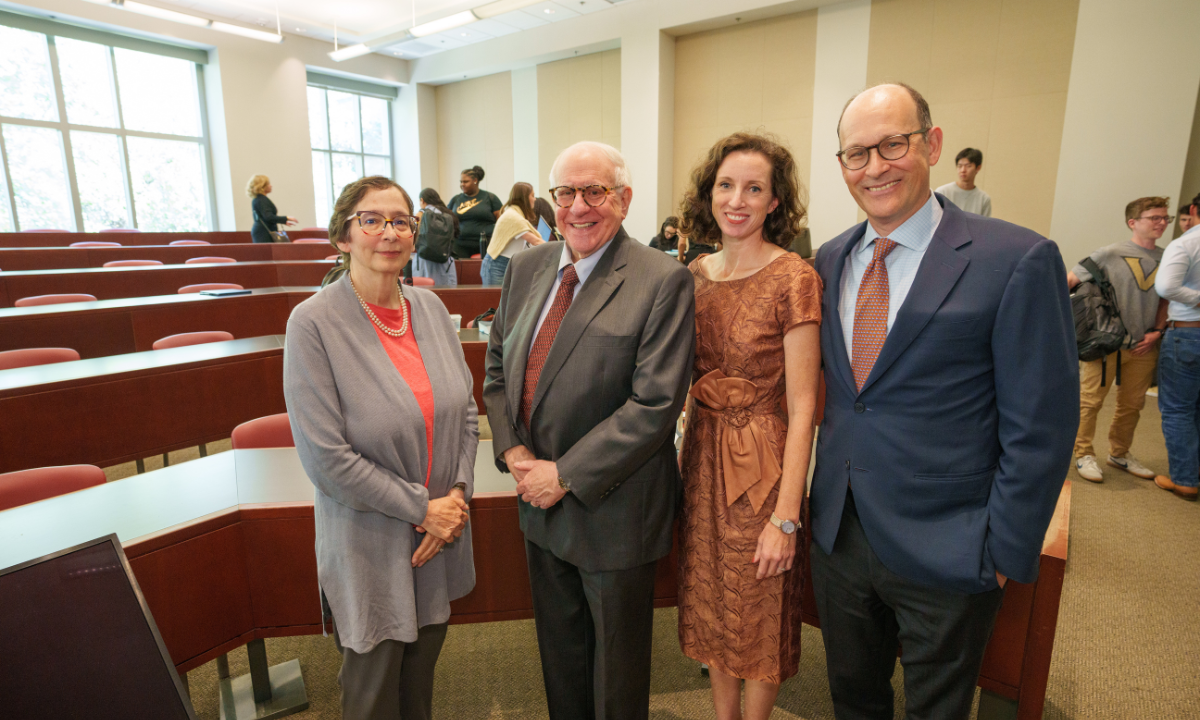After moving to Nashville to join the faculty at Vanderbilt Law School, James Blumstein was denied the right to vote because of Tennessee’s durational residency requirements and decided to sue. Blumstein successfully argued the case himself before the Supreme Court, effectively enfranchising around 6% more potential voters.
On the 50th anniversary of the court’s decision (delayed two years because of the pandemic), Vanderbilt Law School organized a celebration to commemorate Blumstein’s victory. The celebration was moderated by Professor Rebecca Allensworth, Associate Dean for Research and David Daniels Allen Distinguished Chair of Law, and featured Professor Pamela Karlan of Stanford Law School and Lee S. and Charles A. Speir Chair in Law Kevin Stack, along with Professor Blumstein himself—who still teaches at Vanderbilt Law as the University Distinguished Professor of Constitutional Law and Health Law & Policy.
Blumstein’s argument
Karlan offered a history of Tennessee’s election statutes, which, in the 1970s, limited voting rights to male citizens over 21 who had been residents of Tennessee for at least 12 months and of the particular county for three months. Blumstein, having moved to Nashville three weeks before attempting to register, did not meet these criteria.
The brief that Blumstein presented to the Supreme Court argued for strict scrutiny.
“Strict scrutiny is a very traditionally skeptical form of review, in which the law is only upheld if there’s a close fit between the law and some very important government interest,” Karlan said.
Blumstein argued for strict scrutiny under equal protection for two reasons: a fundamental right to vote was being deprived, and there was a penalty on Blumstein’s exercise of his right to travel to and settle in Tennessee. Karlan told the crowd that the Supreme Court had declared that the right to vote was fundamental and depriving people of the right to vote would thereby trigger strict scrutiny under equal protection. Many laws, such as those pertaining to healthcare or the environment, are not protected by the Constitution, but the right to vote is. Blumstein argued that if the Supreme Court did not protect the right to vote, other rights like the right to free speech could be infringed upon by states.
Karlan also recounted how Blumstein connected Tennessee’s voting issues to the citizenship clause of the 14th Amendment, which requires citizens who decide to take residence in a new state to be treated like all other permanent residents of the state. The Supreme Court held that strict scrutiny applied under equal protection and struck down the durational residency requirements as unnecessary for the protection of any compelling interest of the state.
At the time, Tennessee’s rationale for its long residency requirements were that they protected against voter fraud and ensured voters had a “common interest in all matters pertaining to the community’s government.”
Blumstein’s dissection of the second rationale greatly interested Karlan.
“As [Blumstein] pointed out, this rationale reveals a fear of political diversity and a concern that newly arrived Tennesseans might not hold catholic political outlooks,” Karlan said. “The Supreme Court agreed with [Blumstein] that this was an illegitimate motive.”
Karlan finished by expressing her displeasure with the current Supreme Court by explaining another case, Alexander against South Carolina’s state conference of the NAACP.
“The current court and its democracy decisions are a symptom, as much as a cost, of our present condition,” Karlan said.
Blumstein’s impact
Stack praised Dunn v. Blumstein as “surely one of the signature contributions to law ever made by a Vanderbilt faculty member.” Stack put the case’s impact into perspective by explaining that roughly 8 million people move between states every year.
“For those states that might have been inclined to bar them [voters moving] from voting for a year, [Blumstein’s] victory stands as a bar to that, allowing them to vote,” Stack said.
Stack noted that Dunn v. Blumstein has been cited over 80 times in the Supreme Court and 3,000 times in federal courts. He is teaching a class this semester that discusses the case.
Beyond the substance of Blumstein’s argument, Stack also found a profound reminder.
“Jim’s age at the time of the argument was 26,” Stack said. “All of us, young or old or in between, can get out there [and be involved in politics].”
“Americans may not be excluded on the basis of race, ethnicity, sex, language or difference of opinion from the vote,” Stack said. “Thank you, Jim, for your role in bringing that about.”
Blumstein on Blumstein
Blumstein began his segment by explaining his approach to the suit. Rather than fight Tennessee’s claim about voter fraud, Blumstein chose to emphasize that the voter registration process itself was sufficient to combat the kind of fraud that concerned Tennessee. Denying the history of voter fraud was unwise, he contended; it was not necessary for Tennessee to exclude new residents from registering to vote when the concern about fraud could be addressed through voter registration, not lengthy durational residency requirements.
As Blumstein argued, and the Supreme Court agreed, there was in effect a conclusive presumption of voter ignorance, which Blumstein was determined to challenge. He was glad to show that he was at least as knowledgeable as most about local politics. He argued that the basis for the ignorance presumption was weak, and at the very least, people should be allowed to prove that they weren’t ignorant.
Denied his constitutional right to vote, Blumstein came up with an idea that is still in practice today.
“I’ll make out a secret ballot, seal the envelope, and lodge the envelope with election officials. [The voting registrar] said, ‘We don’t know what to do with it, but we’ll take the envelope.’ And so that is how the idea of provisional ballots was developed,” Blumstein said. “They’re now in federal law; it’s routine when the validity of a vote is questioned.”
Blumstein also shared what he referred to as “war stories” from his fight for enfranchisement. At the time of the case, Blumstein lived in an apartment in Nashville, and the Tennessean published articles about his suit. At the time, the Tennessean had a policy to publish the address of any major source they used for any such article. Unfortunately, Blumstein received a death threat in the mail, and his girlfriend, now wife, would get threatening calls. Blumstein asked the Tennessean reporter to remove his home address from the newspaper, and the reporter’s editor agreed to make an exception to the policy in light of the death threats.
When Blumstein appeared before the District Court of Middle Tennessee, Judge Frank Gray reasoned that the 90-day in-county durational residency portion of the case would be moot by the time the election came around in November because Blumstein would be qualified by then to fulfill the in-county requirement. Blumstein wouldn’t budge on the in-county issue, and Judge Gray was not pleased.
“He [Judge Gray] got really red in the face, very cantankerous,” Blumstein said. “And I was too young, too stupid, to be intimidated by him.”
Judge Gray was so infuriated that he even took off his glasses and slammed them on the desk while scolding Blumstein. The professor responded to this by writing a 16-page memorandum on the issue of mootness – the doctrine of capable of repetition, yet evading review — that persuaded Judge Gray to change his mind on the mootness issue. The Supreme Court agreed on that matter.
Blumstein also discussed his appearance before the Supreme Court. At the time, Chief Justice Warren Burger and Associate Justice Harry Blackmun were known as the “Minnesota Twins” for consistently voting together. Blumstein wrote them off, but his dad convinced him that Justice Blackmun would look favorably on his argument; Justice Blackmun became very attentive when he was informed at oral argument that Blumstein’s experiences as a “yuppie” was representative of many people who moved from one state to another to take a new job. His dad’s insight turned out to be accurate, and Blackmun ended up voting in favor of Blumstein (having changed his mind on the matter over the course of the Court’s deliberative process).
The Supreme Court’s ruling on Dunn v. Blumstein has protected voters for half a century. Had Blumstein decided to simply wait out his residency requirement, millions of citizens would find themselves in the same predicament today.



